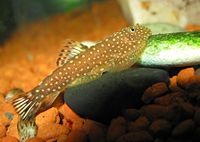Difference between revisions of "Gastromyzon ctenocephalus"
From The Aquarium Wiki
(No difference)
|
Revision as of 12:13, 17 July 2013
Gastromyzon ctenocephalus
45 Litres (12 US G.)
2.5-5.1cm (1-2 ")
Freshwater
7 - 8
20-23.9°C (68 -75 °F)
8-12 °d
1:2 M:F
3-6 years
Family
Balitoridae
Contents
Additional names
- Spiny-Headed Hillstream Loach
Origin
- From fast flowing water in Borneo.
Sexing
- Females are plumper than males.
Tank compatibility
- A peaceful fish that can be kept with other peaceful fish that don't mind the similar requirements this fish needs, in a tank with a strong current and high oxygenation.
Diet
- Omnivorous and will accept most foods including flake, algae wafers, blanched vegetables and live food. Will enjoy frozen bloodworms.
Feeding regime
- Algae pellets should be placed in the bottom of the tank on a regular basis, either daily or every other day.
Environment Specifics
- In the wild this fish is found in streams with a high current, this should be replicated in a tank environment with a strong current and very well aerated with immaculate water parameters. Plants aren't necessary but will help with aeration. They prefer large gravel or rounded stones as substrate.
Behaviour
- A shy bottom dweller. Provide plenty of hiding places with rounded river rocks. Needs it's wild environment replicated with a strong current and high oxygenation. Grazes on algae so needs good algae growth, is not bothered by planting as this fish won't encounter dense plant growth in the wild.
Identification
- Can be mistaken for Gastromyzon scitulus. A fairly chunky looking little fish with a sucker mouth like a pleco. The body is brown in base colour and covered with small cream-yellow spots. All fins are striped and blotched in cream-yellow with a hint of blue. It can be differentiated between this fish and Gastromyzon scitulus by the caudal fin, with this fish the stripes are unbroken and through the whole fin, on the G.scitulus they are broken and staggered in pattern.
Pictures
External links
- Fishbase (Mirrors:
 )
)
